Les Nuits d’Eté is one of my favuorite orchestral song cycles and, along with Strauss’s Vier letzte Lieder, must be one of the most recorded works for voice and orchestra. The songs were originally written to a piano accompaniment and we don’t know why Berlioz chose these six particular texts by his contemporary, Théophile Gautier. Though not really conceived as a cycle, they do make a satsifying programme with two lighter songs framing three deeply emotional outpourings. Berlioz orchestrated Absence in 1846 then orchestrated the remaining songs in 1853, suggesting a mezzo-soprano or tenor for Villanelle, contralto for Le spectre de la rose, baritone (or optionally mezzo or contralto) for Sur les lagunes, mezzo or tenor for Absence, tenor for Au cimetière and mezzo or tenor for L’île inconnue, though nowadays it is more regularly sung by one singer, usually a mezzo or a soprano. It has been recorded by tenors, baritones and bass-baritones and even countertenors.
They have been recorded umpteen times and Ralph Moore has done an exhaustive comparison of most of these recordings, which I recommend to anyone who loves the songs. You can view it at http://musicweb-international.com/classrev/2019/Aug/Berlioz_nuits_survey.pdf.
I have ten recordings in my collection and these are the ten I listened to over a period of two days. The songs respond to a variety of different approaches and I enjoyed my task immensely.
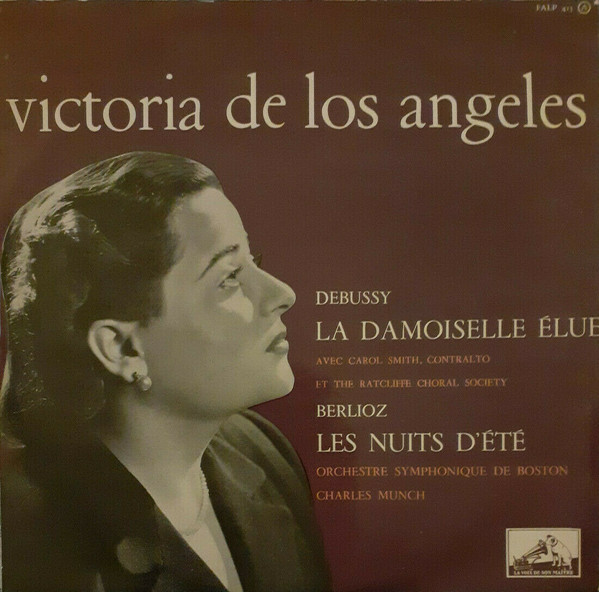
Vctoria De Los Angeles recorded the cycle in 1955 with Charles Munch and the Boston Symphony Orchestra, when she was in superb voice. As always there is a great deal of pleasure to be derived from her singing, her tone suitably plaintive in the middle songs and smilingly bright and playful in the outer songs, which, predictably, is where she is most successful. What I miss is a deeper vein of tragedy, something more grandiloquent in the middle songs, where what we need is a touch of Cassandre and Didon. De Los Angeles reminds me more of a Marguerite. She is in warm, velvety voice, and this is nonetheless one of the most satisfying accounts around. Sonically it can’t measure up to any of the later stereo recordings.
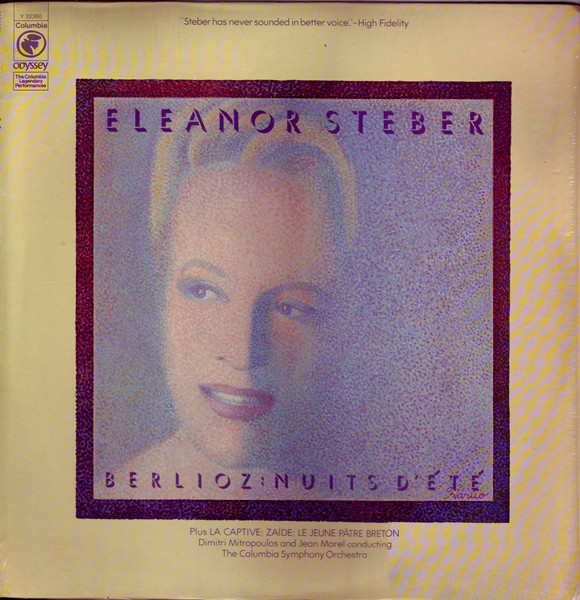
Nor, unfortunately can the Steber version with Dimitri Mitropoulos and the Columbia Symphomy Orchestra. The first impression when listening to this version is of the sheer security and perfect focus of Steber’s beautiful voice. The cycle doesn’t get off to a very impressive start, with Mitropoulos’s too deliberate tempo for Villanelle. It is actually close to the metronome mark of crotchet = 96, but it seems plodding and Mitropoulos fails to make the woodwind light enough. But Steber is gorgeous. She can expand the tone gloriously at a phrase like et parmi la fête étoilée in Le spectre de la rose and the quality remains wonderfully rich down below. Throughout Steber is keenly responisve to the poetry. Au cimetière, for instance, has a real sense of tragic foreboding. What a superb Cassandre she might have been. Definitely a prime contender. If only it had been in better sound.
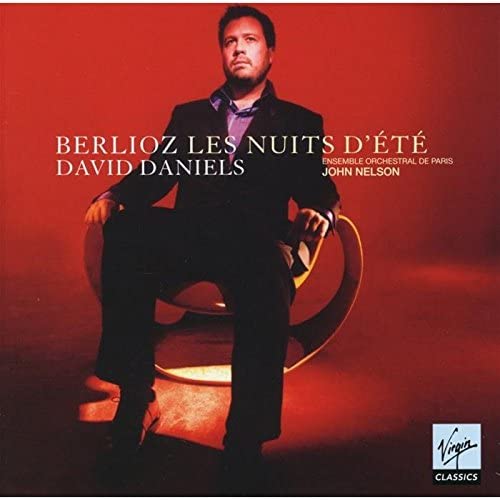
Now here is something rather different. The countertenor voice is not one you would expect to hear in this music, but David Daniels has always had a velvety, rich sound and his version comes as something of a pleasant surprise, though, more used to hearing him in the music of the Baroque, I did wonder if this version might be a product of the gramophone. He did however sing it in the concert hall and his is a voice I’ve never had trouble hearing in the hall or theatre, so maybe I’m wrong. Daniels has excellent French, a perfect legato and is ideally steady throughout, with a much greater range of tone colour than you would expect from a countertenor. As always, his phrasing is wonderfully musical and John Nelson provides excellent support with the Ensemble Orchestral de Paris. Ultimately, for all his musicality and way of commuicating the text, I’m not sure the countertenor voice is what the songs require, but it is a very interesting experiment which Daniels almost pulls off.
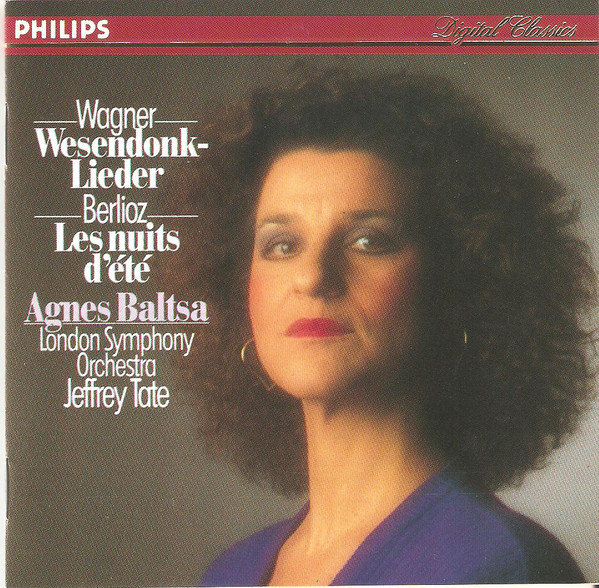
It was quite a shock to plunge from Daniels to the darkly pungent tones of Agnes Baltsa. Her French is often questionable and the voice and manner are arrestingly individual, with her varying her tone from song to song. I suppose you’d call her approach quite operatic. She adopts an almost coy sexuality for Villanelle, choosing a more Dalila-like sensuality for Le spectre de la rose, languidly eliding some of the phrases. Some might find her plunges into chest voice jarring, but I rather like it. The singing can be a bit rough round the edges but you could never call her dull. Ralph Moore suggests that she brings more than a touch of her Carmen to the songs, and I’d agree. It’s not how I’d always like to hear them, but it’s certainly a very individual and occasionally thrilling take on them. Jeffrey Tate and the London Symphony Orchestra provide excellent support.
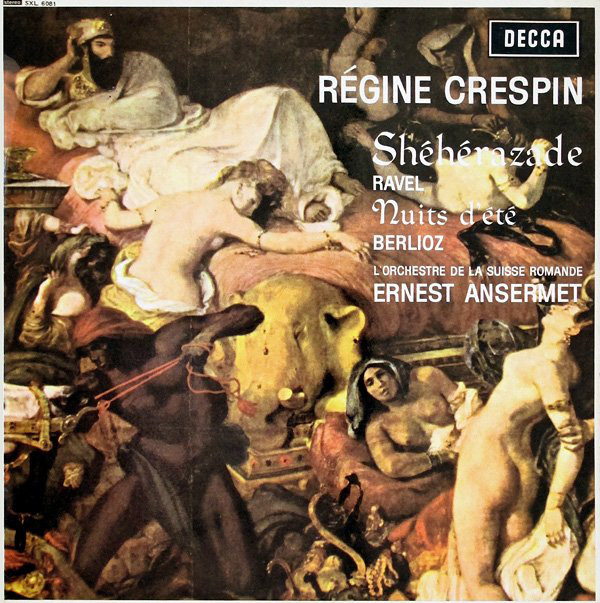
Régine Crespin is the only version included here by a French singer and it is really good to hear the language enunciated so clearly, especially after the idiosyncratic French of someone like Baltsa.
Now Crespin’s version is so famous that it has been a prime recommendation for the work ever since it was first issued in 1963 and dissenting opinions are likley to be viewed with incredulity, but, unlike its coupling of Ravel’s Shéhérazade, I’m not sure the Berlioz holds up that well. For a start, there is a deal of sloppy orchestral playing from L’Orchestre de la Suisse-Romande under Ernest Ansermet, and, for another, Crespin’s singing often tends to the lugubrious. There is no sense of mounting rapture at the arrival of the rose, no sense of despair in Sur les lagunes, no plaintive yearning in Absence. The singing is altogether too civilised, and, however musical and tasteful her singing , however elegant her phrasing, Crespin remains aloof and uninvolved. She is at the oppoiste pole from Baltsa’s often wild and wayward version, but I miss Baltsa’s dramatic involvement, which I ultmately prefer. I see that I’m not alone in my opinion, which is supported by both Ralph Moore and David Cairns (in Song on Record, Volume II). A controversial opinion, no doubt, but I’m sticking to it. Crespin is most successful in the final song, which responds to her vocal equivalent of the ironically arched eyebrow. Another mark against her is that she unaccountably alters the order of the songs, placing Absence before Sur les lagunes, which destroys the balance of the cycle. Intonation is occasionally suspect too, especially in Au cometière.
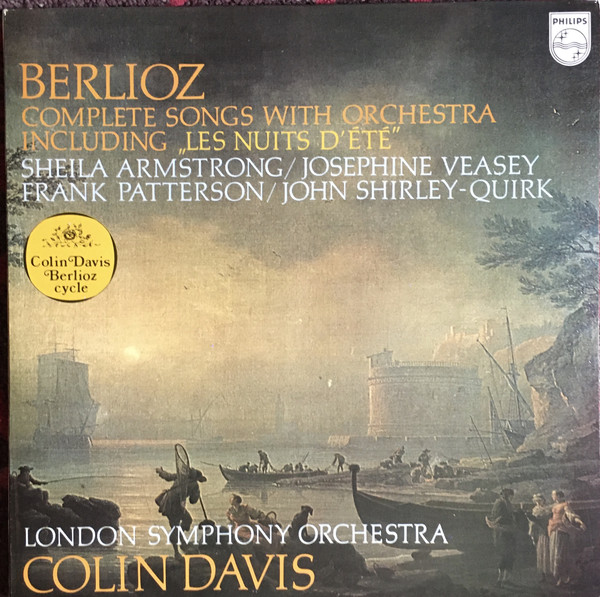
Colin Davis’s multi-singer version is something of an inconclusive experiment. However ineresting it is to hear the songs sung more or less by the voices Berlioz suggested, I think the cycle hangs together better when captured by a single voice. Nor do any of the singers challenge the best of other versions by single singers. Frank Patterson, who has a rather whiny, nasal timbre is granted two songs, Villanelle and Au cimetiére, neither of which he does justice to. Josephine Veasey, an appreciable Berlioz singer, sings a plausible Le spectre de la rose without really illuminating it, and John Shirley-Quirk tends to growl in the lower regions of Sur les lagunes. The most successful of the singers is soprano Sheila Armstrong, who sings in excellent French and turns in a nicely plaintive Absence as well as a charmingly flirtatious L’île inconnue. One would expect Sir Colin and the London Symphony Orchestra to give a brilliant version of the score, but the effect is somewhat somnolent and low key. Interesting but inconclusive.
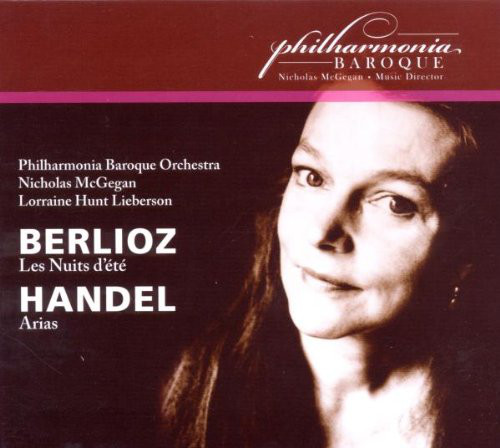
Next we come to the wonderful Lorraine Hunt Lieberson, recorded live at a concert in 1991 or 1995 (the booklet isn’t entirely clear on this point). It has to be said that the Philharmonia Baroque Orchestra under Nicholas McGegan are not quite up to the standard of the ensembles in some of these performances, but they nonetheless provide sensitive accompaniment to Hunt Lieberson’s superbly detailed and deeply heartfelt performances. Throughout she is totally inside the music, her response to the poetry seeming totally spontaneous and natural. Unerringly she captures the mood of each song, certain phrases remaining etched on the memory, for instance the blank, desparing tone at the end of Au cimetière, which, though she switches to smilingly insouciant joy for L’île inconnue, creeps back into her tone for the closing measures when she reminds us that not all is happy au pays d’amour. The voice is surpassingly beautiful, the singing intensely concentrated and she communicates so much. What a great loss she was to the musical world.
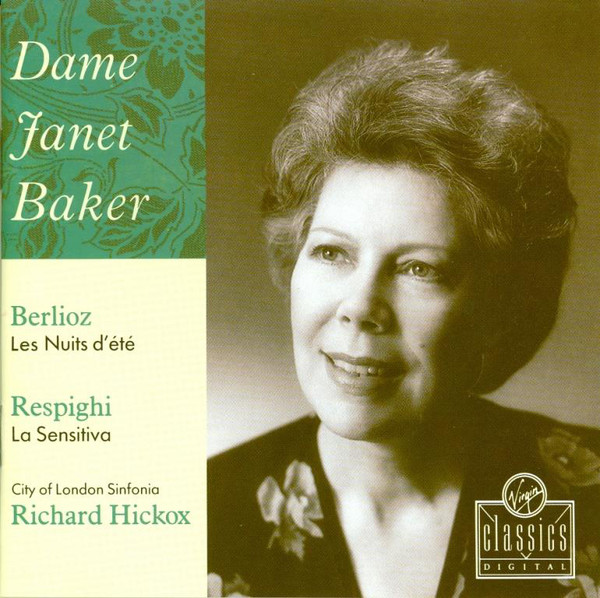
Finally, I come to three versions by the great Dame Janet Baker. The most recent ( recorded in 1990) and the one I will discuss first, was one of her last (maybe her last ever) recording. made shorly after she had retired from the concert platform. By this time her great artistry cannot quite hide the hint of strain in the upper reaches, the discoloration on certain vowels and the loosening of vibrations on sustained high notes. In no way is this competitive with her two other vesions (one live under Giulini and the famous studio one under Barbirolli), so I will only comment by saying I heard Baker and Hickox perform the cycle not long before this recording was made and, live and in the concert hall, it was still an amazing experience.
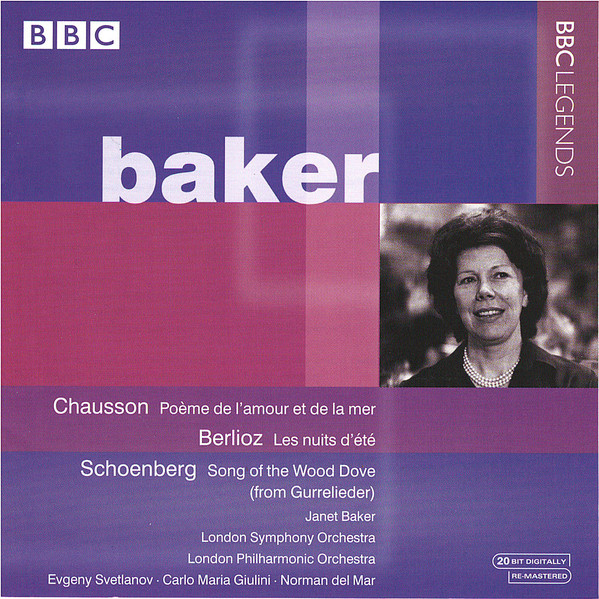
The live Giulini account, taken from a concert at the Royal Festiva Hall in 1975, must be amongst the slowest on disc and it is remarkable that Baker can sustain these speeds; but sustain them she does, luxuriating in the added breadth that Giulini gives her, her breath control quite astonishing. The recorded sound is a trifle muddy and we hear the occasional coughs that go along with live music making, but the specificity of her response to the text is quite extraordinary and there is a concentrated intensity about this performance, which is no doubt enhanced by the presence of a live audience. If I continue to prefer the studio performance, that could be because it is the one by which I got to know the songs and it is no doubt imprinted on my brain. It also, of course enjoys better sound. Both interpretations are absolutely and unequivocally superb. Baker’s stage roles included both Cassandre and Didon and she brings something of the character of their music to these songs too.
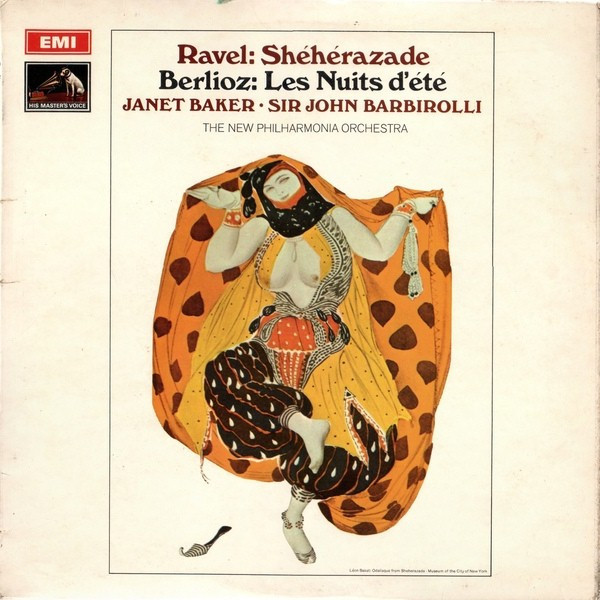
Baker enjoyed a very special relationship with Sir John Barbirolli and of course made a few important recordings with him before he died in 1970. Apart from the above recording of Ravel and Berlioz they can be heard in famous recordings of Elgar’s Sea Pictures, Mahler’s three orchestral song cycles and Elgar’s Dream of Gerontius, all very special and irreplaceable.
The New Philharmonia are in fine form and provide some of the best orchestral playing on any of these performances. Villanelle is perhaps a little too determinedly jolly, but after that the performance just gets better and better. Baker starts Le spectre de la rose almost confidingly, as if whispering into the ear of the sleeping girl, swelling into the glorious mini climax at Et parmi le fête étoilée, Tu me promenas tout le soir. Her tone turns both sensual and erotic when the rose arrives from paradise, and then she sings the phrase Mon destin fut digne d’envie in one glorious, long breath. This might just be the most wonderful performance of the song ever put down on record.
From there we are plunged into the blank, desparing tone of Ma belle amie est morte. If she were the Act IV Didon in the previous song here she is Cassandre, singing in stark absolutes. Having reached a desolate climax the song fades away in a whispered close of utter dejection. She yearns sweetly in Absence, the voice taking on a soprano-ish lightness in the upper register, but maintaining its tragic depth for the line Ah, grands désirs inappaisées. Au cimetière is mesmerisingly hypnotic, conjuring up ghostly visions of graveyards at night, until finally gloom is dispelled and a smile enters her voice for L’île inconnue, with a coquettish twinkle on Est-ce dans la Baltique?
After listening to ten different recordings in two days, I find I love the cycle more than ever and all these recordings have something to offer. I actually enjoyed them all. However if I had to choose but one on that proverbial desert island, then it would have to be Baker with Barbirolli, though I’d probably find a way to smuggle the Hunt Lieberson with me as well somehow.
Wow, what a journey. Here (I hope the right recording) is the Baker/Barbirolli version that Philip chose to take to his island. To share, we will certainly come and visit you there! https://youtu.be/KgVggtS91Xg
LikeLiked by 1 person
Pleased to read your iconoclastic opinion on the Crespin — too much the grande dame and hardly poetic.
If you haven’t seen/heard it, there is a YT upload of a live Copenhagen performance from about 1966 with Janet Baker accompanied by no less than Blomstedt. The poise, naturalness and beauty of her bearing are immediately striking. But it is the profoundly anguished interpretation that is riveting because her singing qua singing is technical and tonal perfection. The audience doubtless didn’t know what they were hearing — as is shown by their polite but cool response.
Nonetheless there are several orchestra musicians who are in evident awe of the experience. This is the greatest Nuits ever captured — hors de concours as it is live and in splendid sound and video.
LikeLiked by 1 person
I’ve seen this performance, and I would agree with you. I was only comparing versions available on CD, but this Copenhagen performance is a valuable memento of Dame Janet in performance. I heard her live in concert several times, but only once in Les nuits d’été, and that towards the end of her career, round about the same time she made the recording with Hickox. For all that her voice wasn’t what it once was, it was an absorbing experience, mostly becuase of the intensity and concentration of her performance. One of the last of the true greats. Only recently I came across a sound only 1968 live performance of the Verdi Requiem under Georg Szell, which is also on YT. Definitely worth seeking out, Dame Janet is absolutely thrilling in music one would not readily associate with her.
LikeLike
Thanks for the admirable analysis which (unoriginally) I concur. I lived in Manhattan after college and saw most of Carnegie Hall recitals — never saw her live otherwise. But I heard many other singers in concert (Ludwig, Norman, Crespin etc) and Dame Janet was in another universe. She ended one recital with Liszt’s Die Lorelei — the hushed ecstasy felt by the silent audience was a high point in my concert going experience — but it was altogether the Baker experience: intensity, complete alignment of text and music, tonal beauty and spiritual depth.
Thanks, also, for the reference to the Szell — not my favorite piece but will look for it (I have the Solti studio (w/L Price)). You make a good point about her singing and recording pieces not normally considered within her range. Her Romeo in Capuleti is a splendid example.
But I was thinking you might do a comparison of Wesendonck’s — there’s a Boult studio, but also a remarkable live Goodall at even slower speeds.
I assume you’re based in London — do you know Ralph Moore? I was friendly with the late Anne Ozorio — there is such a rich community of music lovers there. I live in Southern California — in the desert.
LikeLike
I don’t know the Wesendonck as well as the Berlioz as I’m not such a big Wagnerian. I do of course know and own Baker’s recording with Boult and I’d like to hear the Goodall, which I didn’t know about.
The only other two recordings I actually own are a live Proms version with Anne Evans conducted by Tadaaki Otaka and a somewhat unconventional performance by Agnes Baltsa with Jeffrey Tate. I suppose I could listen to a few others and do a mini comparative review. If I stick to just orchestral versions, It leaves me fewer to choose from.
I don’t know Ralph Moore, but I do of course know a lot of his critiques and often seek them out. I don’t always agree with him (though more often than not, I do) but I find his criticisms always fare and valid.
LikeLike
It was just a thought and I understand. Always best to review music that one is drawn to and studied.
LikeLiked by 1 person
Greetings to Tsaras London and J Huizinga and thanks for the kind comments. Feel free to contact me via MusicWeb or my email should you have any further comments. Best wishes, Ralph Moore
LikeLiked by 1 person